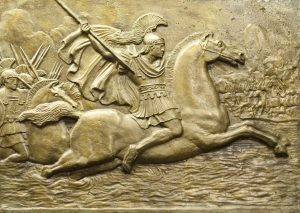 At the first revolution, he was informed that there was doubt about Alexander being king of Asia, thus he was getting ready to go toward Asia-Bactria. Bissos relative of Darius, was the leader. But Alexander decisiveness had no doubt about whom was the leader. He repressed the revolution and gave the message to enemies and friends. In October 330,a conspiracy against him was revealed. Filotas and whoever took part in conspiracy was executed by the Macedonians themselves with their spears. Parmeniona, father of Filotas had the same punishment. It was a very hard time for Alexander, when he gave orders to kill two excellent soldiers of his, which gave him many victories in his campaigns.
At the first revolution, he was informed that there was doubt about Alexander being king of Asia, thus he was getting ready to go toward Asia-Bactria. Bissos relative of Darius, was the leader. But Alexander decisiveness had no doubt about whom was the leader. He repressed the revolution and gave the message to enemies and friends. In October 330,a conspiracy against him was revealed. Filotas and whoever took part in conspiracy was executed by the Macedonians themselves with their spears. Parmeniona, father of Filotas had the same punishment. It was a very hard time for Alexander, when he gave orders to kill two excellent soldiers of his, which gave him many victories in his campaigns.
Alexander established a new city at Drangiane, Alexandria Prophasia, to remember the dangers he had gone through. But until then and the continuation of his life, he realised that he could not trust anyone, not even his close friends and co-workers, not even those that he had tight bonds during military combat.
From January 329 Alexander continued his military action toward the fertile region of Arimanspon, establishing two new cities, Alexandreia and today’s Kandahar and Alexandropolis, at Kalati Gildazi.
Then they conquered Arahosia, a region with military meaning and marched towards the north, where they came against a major problem, the snow, reaching the cliff were Promitheas was tied. There again they established one more city, Alexandreia the capital of Caucasus. In winter his soldiers went past the capital of Afganistan, Kabul. The journey of Alexander and his soldiers had only one direction-India.
At the beginning of 329, Alexander started to pass through Mt Indokous and in April and May struck the biggest cities Baktrias, Aorno and Baktra. He then went towards the river Oxus with the heat that tormented the soldiers. A soldier offered water to Alexander and he said give it to your children. Their king was one of them, during joy, sarrow, hard and easy times, he lived through it with his soldiers. No exception.
Reaching the river Oxus they gave money to the old aged Macedonians and to some Thessalian volunteers, asking them to return to their country and to have children. They refused saying that they would serve him until the end of the war. Passing the river Oxus they reached a small city where the Branchides lived, which their ancestors gave the temple of Apollo to Xerxes (479 B.C.) Alexander destroyed it and took the priest and guards with him. Sacrilege and treason was huge so Alexander destroyed the city. His soldiers continued towards Samarkand and then towards he river Jaxartes which was the boarder of the Persian empire. There at the Asian shore he built Alexandreia the Eshati, in another words the boarder of Alexandreia. In spite of the rebellions of Sogdianon and Bactrion, and Alexander’s serious injuries, the Macedonians prevailed. The year 329 finished off with loses, but even though there were many obstacles and difficult enemies Alexander was the leader.
In the spring of 328 with wars and negotiations with the Scythian Kingdom, which at times the rebelled against Alexander and at times they offered co-operation for common operations. But in autumn of the same year at a dinner at Samarkand. Alexander killed his best friend Kleitos, who saved him in battle at Granikou. Kleitos was sarcastic about Alexander’s Asian politics and his faith when he was son of Ammon. The Macedonian king himself seeing that he killed his unarmed friend, and turned his sword to himself. His guards prevented him and thus enclosed themselves for three days in his room mourning their faithful friend. It was a hard time for Alexander. The lose of one more of his comrades, costhim a lot. This time the death of Kleitos was by his own hands.
At the beginning of 327, Alexander moved towards Sogdian Rock, where his rebels had fled, believing that Alexander could not arrest them there. Of course they believed that there should have been winged soldiers to defeat them. The experienced Macedonian were very good maintaineers, and 300 of them during the night climbed the Rock. In the morning they faced the rebels which paniced and surrendered. Alexander met noble Sogdian Oxyartes’ daughter, Roxane whom later on he married. Alexander then went towards the inaccessible Rock of Horinis which was believed unconquerable.
Facing decisiveness, methodicalness and effectiveness of the Macedonians which was working day and night, to encircle the opposition at the Rock, the Horivi surrendered. Oxyartes admitted that Alexander and his soldiers were unbeatable and that the Macedonian king was an honest man because he did not harm anyone from the city and the region. A little later, at Baktra, a new conspiracy was revealed for the Macedonian’s king’s life. The plan was for his followers to kill Alexander while he was sleeping.
But Alexander did not return to his bed that night and the following day one of his followers told him about the conspiracy. Those who were involved were killed with stoning. The main leader of the conspiracy was Kallistenis who more than anyone was against worshipping Alexander. Kallistenis death caused apathy between Alexander and Aristotelous, but very quickly found once again their old rythem. The fact caused sadness to the philosophers whom criticized Alexander’s actions with fury. This also happened in the case of Filota, which showed that there were others involved desiring Alexander to be murdered.


